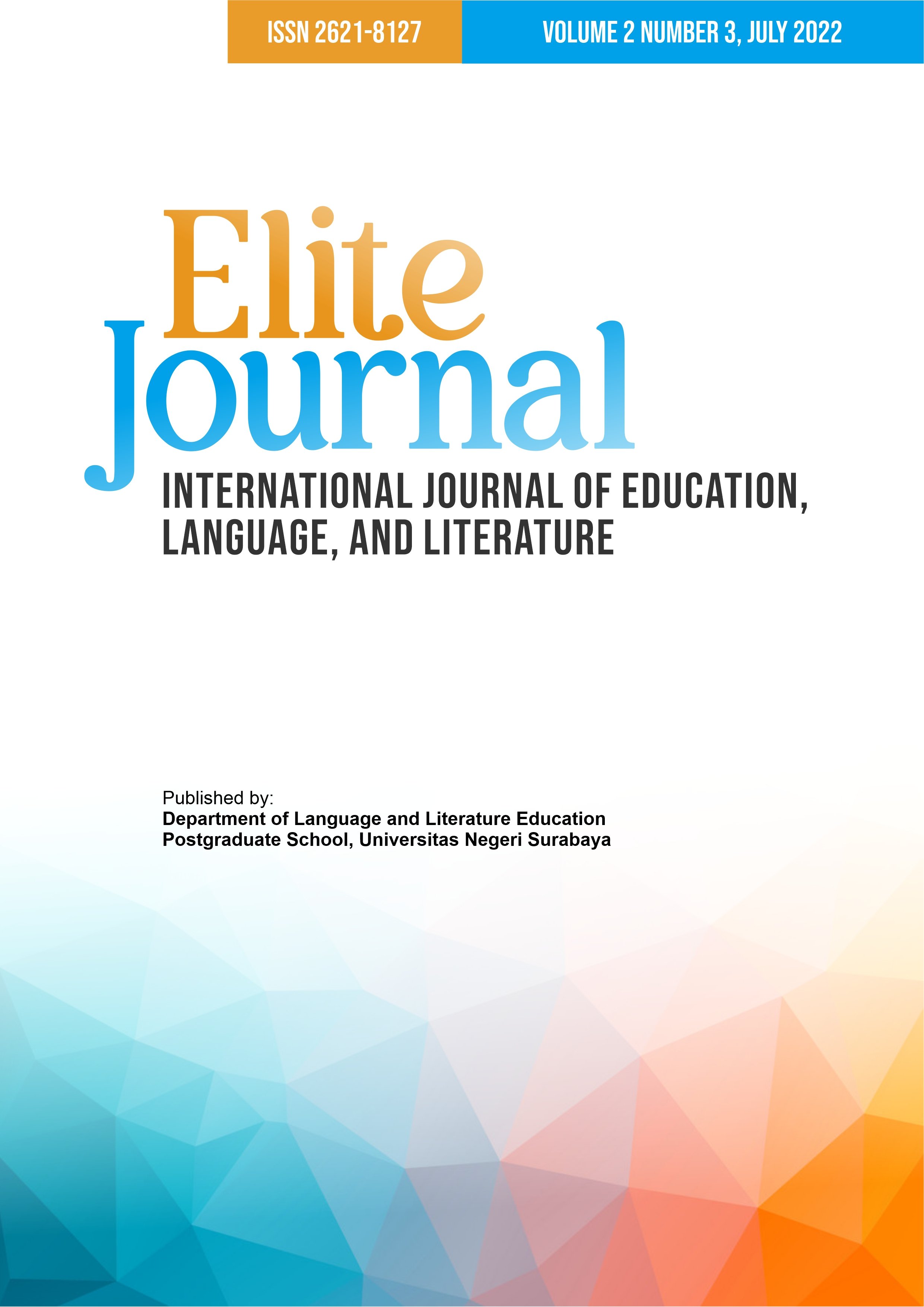THE USE OF DIGITAL STORYTELLING TO ENHANCE THE STUDENTS’ SPEAKING ABILITY
DOI:
https://doi.org/10.26740/elitejournal.v2n3.p168-176Keywords:
speaking ability, English language, digital storytelling, studentsAbstract
The purpose of this study is to identify whether the use of digital storytelling can enhance students' speaking ability in learning English. The research was conducted using a descriptive quantitative method of pretest-posttest control group design for 8th grade junior high school students in Surabaya, Indonesia. A total of 40 students who were divided equally into the control group and the experimental group participated in this study. Students who were included in the experimental group were given treatment by learning English using digital storytelling, while students in the control group were not given this treatment. Based on the results of statistical analysis of the pretest and posttest scores conducted on the two groups of students, it shows that there is a significant difference in the posttest results of the two groups. The average score of the group of students who were not given treatment only increased by 17.02% while the group of students who received treatment increased by 26.79%. The results of the independent samples t test using the Mann-Whitney method at a significance level of 95% (? = 0.05) also showed that the t value was 109.500 < t table 127.000 and the p-value was 0.009 < 0.05. This means that there is a significant difference in posttest results between the group that was given the treatment of digital storytelling and the group that was not given the treatment, so it can be concluded that the use of digital storytelling can enhance students' speaking ability in learning English.
References
Akhyak & Indramawan, A. (2013). Improving the students English speaking competence through storytelling (Study in Pangeran Diponegoro Islamic College (STAI) of Nganjuk, East Java, Indonesia). International Journal of Language and Literature, 1(2), 18-24.
Atta-Alla, M.N. (2012). Integrating language skills through storytelling. English Language Teaching, 5(12), 1-13. DOI: 10.5539/elt.v5n12p1
Burmark, L. (2004). Visual presentations that prompt, flash and transform. Media and Methods, 40(6), 4-5.
Creswell, J. (2003). Research design: Qualitative, quantitative and mixed methods approaches (2nd edition). California, USA: SAGE Publications.
Davis, A. (2004). Co-authoring identity: Digital storytelling in an urban middle school. Technology, Humanities, Education and Narrative Journal, 1(1), 1-21.
Faulin, A., & Sofendi. (2014). Cooperative group learning strategy. Palembang, Indonesia: Penerbit Simetri.
Heaton, J. B. (1988). Writing English language tests. New York, USA: Longman.
Holmes, J. (2001). An introduction to sociolinguistics. London, UK: Pearson Education Limited.
Mulyadi, A. (2011). Kemampuan bahasa Inggris di Indonesia rendah. Harian Kompas. Retrieved 30 December 2020 from: https://ekonomi.kompas.com/read/2011/09/26/21320318/kemampuan.bahasa.inggris.di.indonesia.rendah
Ono, Y. (2014). Motivational Effects of Digital Storytelling on Japanese EFL Learners. In CLaSIC 2014. CLaSIC.
Putra, A.S. (2017). The correlation between motivation and speaking ability. Channing: Journal of English Language Education and Literature, 2(1), 36-57. DOI: 10.30599/channing.v2i1.87
Reinders, H. (2011). Digital storytelling in the foreign language classroom. ELT World Online, 3, 1-9.
Smeda, N., Dakich, E., & Sharda, N. (2014). The effectiveness of digital storytelling in the classrooms: A comprehensive study. Smart Learning Environments, 1(6), 1-21. DOI 10.1186/s40561-014-0006-3
Somdee, M., & Suppasetseree, S. (2012). Developing English speaking skills of Thai undergraduate students by digital storytelling through websites. Proceedings of the 2nd International Conference on Foreign Language Learning and Teaching (2011 FLLT). Language Institute of Thammasat University, Thailand.
Zuana, M.M.M. (2018). Digital storytelling: An attractive media to teach narrative text in speaking class. ALSUNA: Journal of Arabic and English Language, 1(1), 27-39. DOI: 10.31538/alsuna.v1i1.51
Downloads
Published
How to Cite
Issue
Section
License
Copyright (c) 2022 Errika Wafa, Nur Chakim

This work is licensed under a Creative Commons Attribution 4.0 International License.
 Abstract views: 813
,
Abstract views: 813
, PDF Downloads: 706
PDF Downloads: 706





